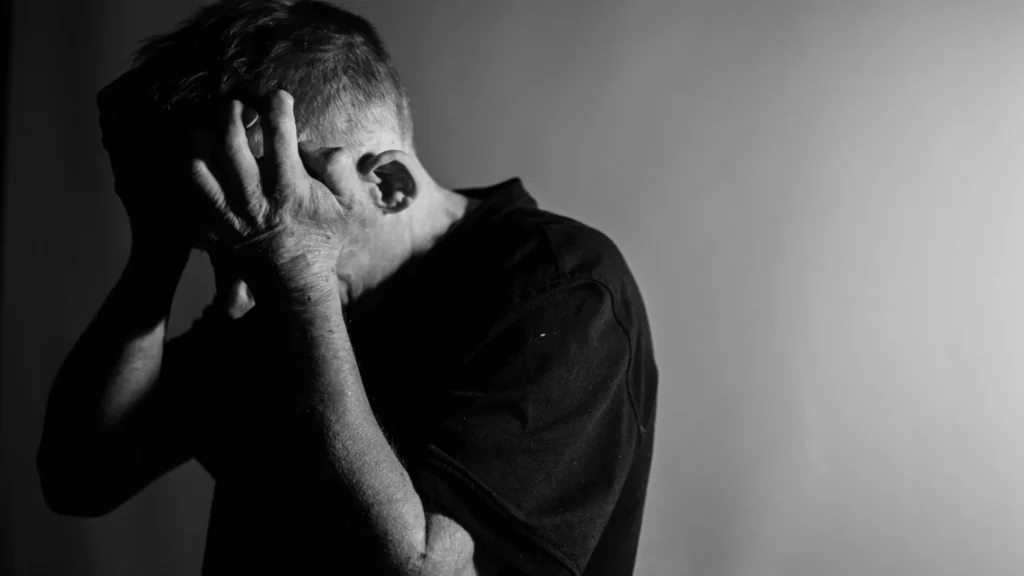“It’s not the weight of the body that causes the strain, but the weight of the mind.”
Introduction
Depression is more than just a fleeting moment of sadness. It’s a complex mental health condition that can deeply affect how we think, feel, and act. In the United States, over 17 million adults experience at least one episode of depression annually, yet it remains one of the most underdiagnosed conditions. So, how can we identify depression before it takes a heavy toll on our lives?
Recognizing the signs of depression early is crucial for managing the condition and getting the support needed to cope effectively. While everyone feels down at times, depression involves persistent symptoms that can interfere with daily life. But how can we tell the difference between regular mood changes and depression?
Let’s explore 10 early warning signs of depression that are often difficult to miss. These signs can serve as indicators that something more serious might be going on, and recognizing them early can lead to better outcomes for those affected.
What is Depression?
Before diving into the signs of depression, it’s essential to understand what depression is. At its core, depression is a mood disorder that affects how we feel, think, and handle daily activities. It can cause feelings of sadness, hopelessness, and a lack of interest in life’s pleasures.
There are various types of depression, including:
- Major Depressive Disorder (MDD): Characterized by persistent sadness and loss of interest in activities.
- Persistent Depressive Disorder (PDD): Also known as dysthymia, it involves long-term, chronic depression.
- Bipolar Disorder: Involves extreme mood swings, including manic episodes and periods of deep depression.
- Seasonal Affective Disorder (SAD): Linked to changes in seasons, typically occurring in the winter months.
- Postpartum Depression: A type of depression that affects new mothers after childbirth.
Depression affects each person differently. Understanding the symptoms of depression and how it impacts life is crucial for identifying it early and seeking help.
Read also: The Science of Happiness: What Exactly Boosts Your Mood in 2 Minutes?
10 Early Warning Signs of Depression That Are Hard to Miss
Recognizing the signs of depression is the first step in seeking treatment. Below are ten early warning signs that can help identify depression, often before it becomes more severe.
1. Persistent Feelings of Sadness
Everyone feels sad from time to time, but persistent feelings of sadness that last for weeks or even months can be a sign of depression. If someone consistently feels down or empty, even without a clear cause, it could point to an underlying issue.
- Key Takeaway: A prolonged sense of sadness, especially when nothing seems to lift your mood, may indicate depression.

2. Loss of Interest in Previously Enjoyable Activities
When depression sets in, it can rob you of joy. Hobbies, activities, or social interactions that were once enjoyable may no longer hold the same appeal. This loss of interest, called anhedonia, is one of the core symptoms of depression.
- Key Takeaway: If you notice that activities you once loved now feel draining or unappealing, it could be a sign of depression.
Read also: 10 Powerful Affirmations for Daily Manifestation: Unlock an Abundant Life
3. Fatigue and Low Energy
A common sign of depression is feeling constantly tired or drained, no matter how much rest you get. This low energy can make it difficult to get out of bed, perform daily tasks, or concentrate at work or school.
- Key Takeaway: Chronic fatigue, even after a full night’s sleep, is a strong indicator that depression may be at play.
4. Sleep Disturbances
Whether it’s insomnia or sleeping too much, depression can wreak havoc on sleep patterns. People with depression may find themselves lying awake for hours, struggling to fall asleep, or feeling the need to sleep excessively as a form of escape.
- Key Takeaway: A significant change in your sleep patterns can be an important sign of depression.
Read also: 6 Brilliant Sleep Meditation Tips for a Restful Mind
5. Changes in Appetite or Weight
Depression can impact appetite in various ways. Some people may lose interest in food and experience weight loss, while others may turn to food for comfort, leading to weight gain. Both extremes are associated with depression.
- Key Takeaway: Noticeable weight fluctuations, either up or down, can be a warning sign of depression.
Read also: Overcoming Weight Loss Motivation Struggles: 7 Interesting Hacks
6. Feelings of Worthlessness or Guilt
Depression often brings with it a harsh inner critic. Feelings of worthlessness or guilt may intensify, and individuals may believe that they are a burden to others or that they are failing at life.
- Key Takeaway: When self-criticism becomes overwhelming and persistent, it may be a sign that depression is present.
Read also: Overcoming Self-Doubt: 6 Easy Techniques to Unlock Your Potential
7. Difficulty Concentrating
When depression takes hold, it can impair cognitive functions, making it harder to concentrate, make decisions, or remember things. This can affect both work and personal life, leading to frustration.
- Key Takeaway: Struggling to concentrate or experiencing mental fog can be linked to depression.
8. Irritability or Anger
While sadness is a hallmark of depression, irritability or anger can also be significant indicators. Depression can cause emotional outbursts or a short temper, often over minor frustrations.
- Key Takeaway: If you find yourself more irritable or angry than usual, depression could be the underlying cause.

9. Physical Ailments Without Clear Causes
Depression can manifest physically, causing unexplained aches, pains, and digestive issues. These symptoms often don’t respond to typical treatments and may worsen with time.
- Key Takeaway: Ongoing physical symptoms like headaches, back pain, or stomach issues may be linked to depression.
10. Thoughts of Death or Suicide
One of the most severe symptoms of depression is a preoccupation with death or thoughts of suicide. This can range from fleeting thoughts to detailed plans, and it requires immediate intervention.
- Key Takeaway: If thoughts of self-harm or death occur, seeking professional help is critical.
Read also: 10 Dangerous Mistakes That Harm Emotional Well-being
How Depression Affects Life
Depression goes beyond just affecting mood—it can deeply influence various areas of life. Here are some of the ways depression affects life:
- Relationships May Suffer: Individuals with depression may withdraw emotionally, leading to strained relationships with family, friends, and partners.
- Work Performance Declines: Depression can impair concentration and energy, affecting productivity and performance at work or school.
- Increased Social Isolation: As depression intensifies, individuals may pull away from social interactions, feeling disconnected or misunderstood.
- Difficulty Maintaining Self-Care: Simple self-care routines, such as eating healthy, exercising, or maintaining hygiene, may feel overwhelming to those struggling with depression.
- Physical Health Impacts: Depression can manifest physically, causing fatigue, sleep disturbances, and other ailments that further affect daily activities.

Recognizing the signs of depression early is essential, as untreated depression can have long-lasting effects on both personal relationships and work life. It’s important to understand that depression is not a sign of weakness but a treatable medical condition. Seeking help and treatment can help mitigate its impact and improve quality of life.
Read also: 6 Surprising Ways Self-Care Therapy Heals Negativity
When to Seek Help for Depression
If any of the signs of depression resonate with you or someone you care about, it’s important to seek help as soon as possible. Depression is a treatable condition, and early intervention can make a significant difference in the long-term management of the disorder. If feelings of sadness, hopelessness, or lack of interest persist for more than two weeks, it’s a strong indication that professional help is needed.
There are several effective treatment options available, including Cognitive Behavioral Therapy (CBT), which helps individuals challenge negative thought patterns, and medications such as antidepressants, which can help regulate mood. Additionally, lifestyle changes like regular exercise, a healthy diet, and consistent sleep schedules can contribute to managing depression.
Support groups, both in-person and online, provide a community of individuals who share similar experiences and can offer encouragement and understanding. Seeking help is the first step toward reclaiming control over your mental health and improving overall well-being.
Treatment Options for Depression
There are several treatment options available for those struggling with depression:
- Psychotherapy: Talking to a licensed therapist can help individuals uncover the root causes of their depression and learn coping strategies.
- Medication: Antidepressants, prescribed by a doctor, can help regulate the chemicals in the brain that affect mood.
- Self-care for Depression: Incorporating mindfulness, exercise, and healthy eating habits can have a positive impact on managing depression.

Read also: Quick and Effective 5-Minute Mindfulness Exercises for Busy People
Conclusion
Depression is a serious condition that affects millions of people every year. Recognizing the signs of depression early on is crucial in getting the right support and treatment. If you notice persistent changes in mood, behavior, or energy levels, it’s important to seek help. The earlier the intervention, the better the chance for effective recovery.
Remember, you’re not alone in this journey. Whether it’s through professional therapy, medication, or lifestyle adjustments, there are effective ways to manage depression and improve your well-being.
FAQs
1. What are the early signs of depression?
Early signs of depression include persistent sadness, loss of interest, and fatigue, among others. Recognizing these symptoms early can help seek timely support.
2. Can depression be cured?
While depression may not have a “cure,” it is highly treatable with therapy, medication, and self-care strategies.
3. How long do depression symptoms last?
Symptoms of depression can last weeks or months. Early intervention can reduce the duration and severity of symptoms.
4. Is depression always linked to sadness?
No, depression can manifest in various ways, including irritability, anger, and physical symptoms, not just sadness.
5. What can I do for self-care during depression?
Regular exercise, healthy eating, and practicing mindfulness can help manage depression and improve emotional well-being.




One thought on “10 Early Warning Signs of Depression That Are Hard to Miss”